考研英语阅读理解精读篇解析
2010年考研英语(一)阅读 text2精读精讲
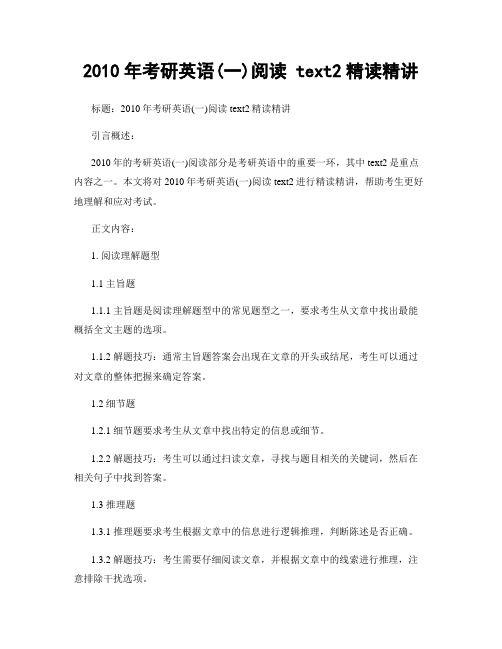
2010年考研英语(一)阅读 text2精读精讲标题:2010年考研英语(一)阅读 text2精读精讲引言概述:2010年的考研英语(一)阅读部分是考研英语中的重要一环,其中text2是重点内容之一。
本文将对2010年考研英语(一)阅读 text2进行精读精讲,帮助考生更好地理解和应对考试。
正文内容:1. 阅读理解题型1.1 主旨题1.1.1 主旨题是阅读理解题型中的常见题型之一,要求考生从文章中找出最能概括全文主题的选项。
1.1.2 解题技巧:通常主旨题答案会出现在文章的开头或结尾,考生可以通过对文章的整体把握来确定答案。
1.2 细节题1.2.1 细节题要求考生从文章中找出特定的信息或细节。
1.2.2 解题技巧:考生可以通过扫读文章,寻找与题目相关的关键词,然后在相关句子中找到答案。
1.3 推理题1.3.1 推理题要求考生根据文章中的信息进行逻辑推理,判断陈述是否正确。
1.3.2 解题技巧:考生需要仔细阅读文章,并根据文章中的线索进行推理,注意排除干扰选项。
2. 文章结构分析2.1 开头段落2.1.1 开头段落通常会引出文章的主题或背景信息。
2.1.2 解题技巧:考生可以通过阅读开头段落来了解文章的整体结构和主题。
2.2 主体段落2.2.1 主体段落是文章的核心部分,包含了文章的主要内容和观点。
2.2.2 解题技巧:考生需要仔细阅读主体段落,理解作者的观点和论证过程。
2.3 结尾段落2.3.1 结尾段落通常会总结文章的主要观点或提出作者的建议。
2.3.2 解题技巧:考生可以通过阅读结尾段落来了解文章的结论或作者的态度。
3. 阅读技巧3.1 阅读速度3.1.1 快速阅读可以帮助考生抓住文章的大意和主要观点。
3.1.2 解题技巧:考生可以通过快速阅读整篇文章,了解文章的结构和主题,然后再进行细读。
3.2 关键词3.2.1 关键词是文章中的重要信息,可以帮助考生理解文章的主题和细节。
3.2.2 解题技巧:考生可以通过寻找关键词,快速定位文章中的相关信息。
2010年考研英语(一)阅读 text 4 精读精讲

2010年考研英语(一)阅读text 4 精读精讲一、了解2010年考研英语(一)阅读Text 4的文章背景和结构2010年考研英语(一)阅读Text 4是一篇关于科学家研究人类记忆能力的文章。
文章通过介绍一项实验研究,探讨了人类在特定情境下如何形成和巩固记忆,以及性别差异在记忆过程中的作用。
二、分析文章中的关键词和难懂句子1.关键词:记忆、情境、性别差异、实验研究、海马体等。
2.难懂句子:例如,“Their findings suggest that the formation and consolidation of human memory may be more complex than previously thought, and that gender differences play a role in this process.”(他们的研究发现,人类记忆的形成和巩固可能比以前想象的要复杂,而性别差异在这个过程中发挥作用。
)三、提炼文章的主要观点和论述1.文章主要观点:人类记忆的形成和巩固过程可能比之前认为的更复杂,性别差异在其中发挥作用。
2.文章论述:首先介绍了记忆的形成和巩固过程,然后分析了实验研究中男女受试者的表现差异,最后指出性别差异在记忆过程中的作用。
四、给出针对性的解题技巧和策略1.解题技巧:针对此类科学研究类文章,可先了解文章背景,关注实验目的、过程和结果;2.解题策略:在阅读过程中,注意捕捉关键词,以便快速理解文章主旨;同时,关注难懂句子,分析其表达的观点和论述。
五、总结文章的实用点和启示1.实用点:了解人类记忆的形成和巩固过程,以及性别差异在其中的作用;2.启示:认识到记忆研究的复杂性,并在实际生活中关注性别差异在记忆方面的表现,以提高学习和沟通效果。
考研英语历年真题阅读理解精读笔记(一)

众所周知,考研是⼈⽣的⼀次重新洗牌和重⼤机遇,⽽在考研的四门课程中,英语成了许多考⽣前进征途上的⼀只凶猛拦路虎和⼗分困难的羁跘与障碍。
详细分析历年考研英语试卷,⼜可以发现主要⽭盾在于阅读(占60%的分数),故可谓:得阅读者得天下。
阅读的60分细分为Part A、Part B 和Part C,其中Part A为四篇阅读理解,占40分,是阅读理解考试中的主战场。
那么,阅读Part A有没有什么技巧呢? 技巧⼀:看懂 阅读理解其实主要考的是“阅读”之后的“理解”,所以,看得懂乃是第⼀项技巧。
任何⼀篇⽂章,若要能看懂它,⾄少需要两个条件:认识单词和看明⽩句⼦。
单词就像盖房的砖⽡,考研词汇⼤约为5500个,这不是⼀个⼩数字,也并⾮三两天时间可以记住的,所以,考⽣必须先买⼀本考研英语词汇书进⾏系统、长期的学习和记忆。
(推荐《考研英语词汇真题词频语境记忆》,该书打破了传统考研词汇书按字母顺序排序的做法,⽽是采⽤历年真题作为单词出现频率的统计依据,将所有⼤纲单词及超纲单词按照历年真题出现的频率从⾼到低排列,⽽且全部按照考过的不同词义配不同的真题例句,可以使学⽣⽤最少的时间获得的学习效果)。
拿到词汇书之后,⾸先⽤⼤约⼀周的时间把这些单词中你根本不认识的挑出来,如rear,tedious,deteriorate,plausible,jargon,isotope,……,(因为这些单词你可能完全不认识,看到之后两眼漆⿊,所以称之为“⿊”字)。
“⿊”字是阅读的头⼀个障碍,单词不认识,句⼦当然看不懂,所以,消灭“⿊”字是当务之急。
(争取⽤⼀个⽉左右的时间消灭它们!) 考研词汇中,除“⿊”字外,还有⼤量意思⾮常明⽩的所谓“⽩”字,如:able,benefit,culture,space,topic,……。
此类单词可⼀掠⽽过,除“⿊”(完全不认识)和“⽩”(完全明⽩)字两类外,还有许多似会不会的“灰”字,如:treaty,tutor,sample,saddle,fuss,……。
考研英语阅读理解精读100篇:UNIT-6
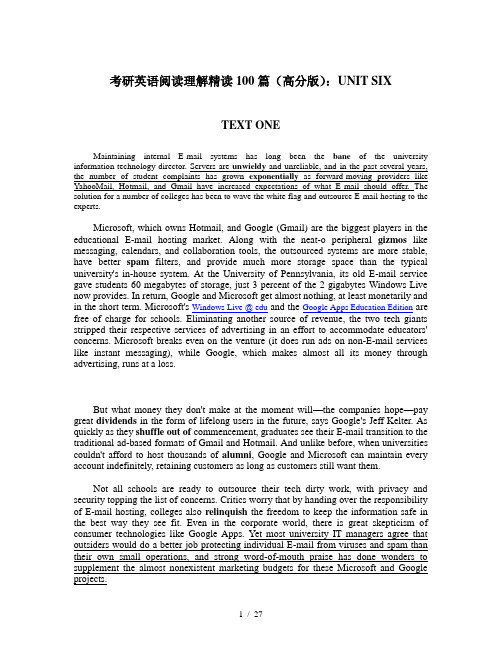
考研英语阅读理解精读100篇(高分版):UNIT SIXTEXT ONEMaintaining internal E-mail systems has long been the bane of the university information-technology director. Servers are unwieldy and unreliable, and in the past several years, the number of student complaints has grown exponentially as forward-moving providers like YahooMail, Hotmail, and Gmail have increased expectations of what E-mail should offer. The solution for a number of colleges has been to wave the white flag and outsource E-mail hosting to the experts.Microsoft, which owns Hotmail, and Google (Gmail) are the biggest players in the educational E-mail hosting market. Along with the neat-o peripheral gizmos like messaging, calendars, and collaboration tools, the outsourced systems are more stable, have better spam filters, and provide much more storage space than the typical university's in-house system. At the University of Pennsylvania, its old E-mail service gave students 60 megabytes of storage, just 3 percent of the 2 gigabytes Windows Live now provides. In return, Google and Microsoft get almost nothing, at least monetarily and in the short term. Microsoft's Windows Live @ edu and the Google Apps Education Edition are free of charge for schools. Eliminating another source of revenue, the two tech giants stripped their respective services of advertising in an effort to accommodate educators' concerns. Microsoft breaks even on the venture (it does run ads on non-E-mail services like instant messaging), while Google, which makes almost all its money through advertising, runs at a loss.But what money they don't make at the moment will—the companies hope—pay great dividends in the form of lifelong users in the future, says Google's Jeff Kelter. As quickly as they shuffle out of commencement, graduates see their E-mail transition to the traditional ad-based formats of Gmail and Hotmail. And unlike before, when universities couldn't afford to host thousands of alumni, Google and Microsoft can maintain every account indefinitely, retaining customers as long as customers still want them.Not all schools are ready to outsource their tech dirty work, with privacy and security topping the list of concerns. Critics worry that by handing over the responsibility of E-mail hosting, colleges also relinquish the freedom to keep the information safe in the best way they see fit. Even in the corporate world, there is great skepticism of consumer technologies like Google Apps. Yet most university IT managers agree that outsiders would do a better job protecting individual E-mail from viruses and spam than their own small operations, and strong word-of-mouth praise has done wonders to supplement the almost nonexistent marketing budgets for these Microsoft and Google projects.The price tag—or lack of one—isn't a bad sales pitch either. Ramin Sedehi, the vice dean for finance and administration at Penn, says 30 percent of Penn's students already forward their messages to outside clients, and he predicts universities will eventually be out of the E-mail hosting business altogether. Ball State University and the Indiana University Alumni Association are now on Windows Live, and Arizona State University switched to Google Apps in October 2006, already converting at least 40,000 of its 65,000 students to the new system. Penn State University and California Polytechnic State University, to name two, have been in talks, while other schools are watching and waiting.1. The number of student complaints has grown exponentially because_____[A] the school servers are unwieldy and unreliable.[B] the information-technology director is not the expert in providing IT-related assistance.[C] the internal E-mail systems are much more backward than those commercially successful email systems.[D] there are no collaboration tools in the internal E-mail systems.2. Microsoft and Google do not run ads on the E-mail systems for schools because_____[A] they want to cater to the requirements of their clients.[B] they are sponsored by schools and do not need the revenue from ads.[C] they want to build up a unique community with life-long loyalty.[D] they want to maintain the stability of the systems at the present.3. Compared with the universities, the advantage of Goole and Microsoft in hosting accounts of alumni is _____ [A] that they can reserve every account with minimum charge.[B] that they can retain every account at customers’ wish.[C] that they can maintain every account as long as the customers want.[D] that they can keep every account fro free ina long term.4. The two giants persist in providing the E-mail services though they run at a loss because_____[A] they believe they will have good returns from the would-be lifelong users in the future.[B] it is part of their social commitment to return the society through contributing to education.[C] their strategy is to make profit through advertisement to university alumni.[D] they want the students to propagandize for their projects.5. The word “relinquish” (Line 3, Paragraph 4)most probablymeans_____[A] lose.[B] abandon.[C] exchange. [D]waste.文章剖析:这篇文章介绍了大学将自己的电邮系统外包给微软、谷歌等公司。
考研英语历年真题阅读理解精读笔记(十一)

TEXT 4 It is said that in England death is pressing, in Canada inevitable and in California optional.Small wonder.Americans life expectancy has nearly doubled over the past century.Failing hips can be replaced, clinical depression controlled, cataracts removed in a 30-minute surgical procedure.Such advances offer the aging population a quality of life that was unimaginable when I entered medicine 50 years ago.But not even a great health care system can cure death-and our failure to confront that reality now threatens this greatness of ours. Death is normal; we are genetically programmed to disintegrate and perish, even under ideal conditions.We all understand that at some level, yet as medical consumers we treat death as a problem to be solved.Shielded by third party payers from the cost of our care, we demand everything that can possibly be done for us, even if it's useless.The most obvious example is late stage cancer care.Physicians-frustrated by their inability to cure the disease and fearing loss of hope in the patient-too often offer aggressive treatment far beyond what is scientifically justified. In 1950, the US spent $12.7 billion on health care. In 2002, the cost will be $1540 billion.Anyone can see this trend is unsustainable.Yet few seem willing to try to reverse it.Some scholars conclude that a government with finite resources should simply stop paying for medical care that sustains life beyond a certain age-say 83 or so.Former Colorado governor Richard Lamm has been quoted as saying that the old and infirm "have a duty to die and get out of the way", so that younger, healthier people can realize their potential. I would not go that far.Energetic people now routinely work through their 60s and beyond, and remain dazzlingly productive.At 78, Viacom chairman Sumner Redstone jokingly claims to be 53.Supreme Court Justice Sandra Day O Connor is in her 70s, and former surgeon general C.Everett Koop chairs an Internet start up in his 80s.These leaders are living proof that prevention works and that we can manage the health problems that come naturally with age.As a mere 68 year-old, I wish to age as productively as they have. Yet there are limits to what a society can spend in this pursuit.As a physician, I know the most costly and dramatic measures may be ineffective and painful.I also know that people in Japan and Sweden, countries that spend far less on medical care, have achieved longer, healthier lives than we have.As a nation, we may be overfunding the quest for unlikely cures while underfunding research on humbler therapies that could improve people's lives. 56. What is implied in the first sentence? [A] Americans are better prepared for death than other people. [B] Americans enjoy a higher life quality than ever before. [C] Americans are over confident of their medical technology. [D] Americans take a vain pride in their long life expectancy. 57. The author uses the example of cancer patients to show that . [A] medical resources are often wasted [B] doctors are helpless against fatal diseases [C] some treatments are too aggressive [D] medical costs are becoming unaffordable 58. The author's attitude toward Richard Lamm's remark is one of . [A] strong disapproval [B] reserved consent [C] slight contempt [D] enthusiastic support 59. In contrast to the US, Japan and Sweden are funding their medical care . [A] more flexibly [B] more extravagantly [C] more cautiously [D] more reasonably 60. The text intends to express the idea that . [A] medicine will further prolong people's lives [B] life beyond a certain limit is not worth living [C] death should be accepted as a fact of life [D] excessive demands increase the cost of health careachieve12 v.①完成,实现;②达到,达成,获得 aggressive5 a.①侵略的,好⽃的;②⼤胆的,积极的 attitude14 n.①(to,towards)态度,看法;②姿势 author69 n.①作者;②创始⼈ billion11 num./n.[美]⼗亿,[英]万亿 cancer11 n.癌 chair4 n.①椅⼦;②主席(职位);vt.主持,担任 claim12 v.①要求;②声称,主张;③索赔;n.①要求;②主张,断⾔;③索赔;④权利,要求权,所有权 conclude5 v.①结束,终结;②断定,下结论;③缔结,议定 confident3 a.(of,in)确信的,⾃信的 confront3 v.①使⾯临,使遭遇;②⾯对(危险等) consent3 v./n.(to)同意,赞成,答应 contempt4 n.轻蔑,藐视 contrast5 v.对⽐,对照;n.对⽐,对照,差异 court10 n.①法院,法庭;②宫廷,朝廷;③院⼦;④球场 doctor12 n.①博⼠;②医⽣;v.伪造,篡改 dramatic4 a.①戏剧的,戏剧性的;②剧烈的,激进的;③显著的,引⼈注⽬的 energetic2 a.有⼒的,精⼒旺盛的 enthusiastic2 a.热情的,热⼼的 excessive3 a.过多的,过分的来源:考试⼤ express4 v.表达,表⽰;a.特快的,快速的;n.快车,快运 failure6 n.①失败,不及格;②失败者;③故障,失灵;④未能 fatal4 a.致命的,毁灭性的 finite2 a.有限的 former10 a.①前任的;②以前的,在前的;pron.前者 frustrate1 v.挫败,阻挠,使灰⼼ fund14 n.资⾦,基⾦;v.资助,投资 governor1 n.总督,州(省)长 hip2 n.髋部;a.时髦的 humble2 a.①谦卑的,恭顺的;②低下的,卑微的;v.降低,贬抑 ideal5 a.①理想的,完美的;②空想的;③理想主义的;④唯⼼的;n.理想 imply12 v.意指,含...意思,暗⽰ inevitable5 a.不可避免的,必然发⽣的 intend15 v.想要,打算,企图 justice2 n.①公正,公平;②审判,司法;③法官 justify8 v.证明...是正当的,认为有理 measure14 v.测量;n.①尺⼨,⼤⼩;②[常pl.]措施,办法;③法案,法律规定 mere7 a.①纯粹的;②仅仅,只不过 obvious13 a.明显的,显⽽易见的 optional1 a.可以任选的,⾮强制的 painful5 a.疼痛的,使痛苦的 perish1 v.①丧⽣;②凋谢;③毁灭,消亡 physician10 n.内科医⽣ potential13 a.①潜在的,可能的;②势的,位的;n.潜能,潜⼒ procedure4 n.程序,⼿续,步骤 productive4 a.⽣产(性)的,能产的,多产的 prolong3 v.拉长,延长 proof2 n.①证据,证明;②校样,样张 pursuit6 n.①追赶,追求;②职业,⼯作 quest3 n.寻求 quote5 v.引⽤,援 reality10 n.①现实,实际;②真实 remark7 n.(about,on)评语,议论,意见;v.①(on)评论,谈论;②注意到,察觉 replace7 v.①放回,替换,取代;②归还 reserve2 n.①储备(物),储藏量,储备⾦;②缄默,谨慎;v.①保留,储备;②预定,预约 resource7 n.①[pl.]资源,财⼒;②办法,智谋;③应变能⼒;④设备 reverse1 n.①相反,反转,颠倒;②背⾯,后⾯;a.相反的,倒转的;v.颠倒,倒转,(使)倒退 scholar5 n.学者 sentence9 n.①句⼦;②判决,宣判;v.宣判,判决 shield2 n.①防护物,护罩;②盾,盾状物;v.保护,防护 solve9 v.解决,解答 supreme2 a.①极度的,最重要的;②⾄⾼的,的 surgeon1 n.外科医⽣ sustain5 v.①⽀撑,撑住;②维持,持续,经受,忍耐 system31 n.①系统,体系;②制度,体制 technology27 n.⼯艺,技术 therapy2 n.治疗,理疗 threaten8 v.①恐吓,威胁;②有...危险,快要来临 trend12 n.倾向,趋势;v.伸向,倾向 unlikely5 a.未必的,靠不住的 vain2 a.①徒劳的,徒然的;②⾃负的,虚荣的;n.徒劳,⽩费 worth5 n.价值;a.值得的 advance10 v.①前进,进展;②推进,促进;③提出(建议等);④提前;n.①前进,进展;②预付,预⽀ cataract1 n.①⼤瀑布;②⽩内障 cautiously1 ad.慎重地 clinical1 a.临床的 consumer20 n.消费者 dazzlingly1 ad.灿烂地,耀眼地 depression2 n.①沮丧,消沉;②(经济)萧条,不景⽓ disapproval1 n.不赞成 disintegrate1 vt.(使)分解,(使)碎裂 expectancy2 n.期待,期望 extravagantly1 ad.挥霍⽆度地 flexibly1 ad.易曲地,柔软地 genetically2 ad.遗传地 inability1 n.⽆能,⽆⼒ ineffective2 a.⽆效的 infirm1 a.弱的,不坚固的,柔弱的 leader10 n. overfund1 vt.对...提供充⾜资⾦ productively1 ad.有结果地,有成果地 reasonably2 ad.适度地,相当地 routinely1 ad.例⾏公事地 surgical1 a.外科的,⼿术上的;n.外科病房,外科⼿术 treatment7 n.待遇,对待,处理,治疗 unaffordable1 a.供应不起的 underfund1 vt.投资不⾜ unimaginable2 a.,想不到的,不可思议的 unsustainable1 a.不能成⽴的,不能⽀持的 难句1 Shielded by third party payers from the cost of our care, we demand everything that can possibly be done for us, even if it’s useless. [结构分析] 1. 本句主⼲结构为:... we demand everything ... ; 2. everything后⾯是that引导的定语从句,that在从句中作主语; 3. 第⼀个逗号前为过去分词短语shielded引导的状语成分,第⼆个逗号后⾯是even if引导的让步状语从句; [本句难点]主要是过去分词作状语,以及定语从句的⽤法; [⽅法对策]抓住句⼦主⼲,然后再分析状语等其他成分; [例句精译]由于医疗费⽤由第三⽅⽀付,我们常常要求⽤尽所有的医疗⼿段,即使它们不会有任何作⽤。
考研英语历年真题阅读理解精读笔记(八)
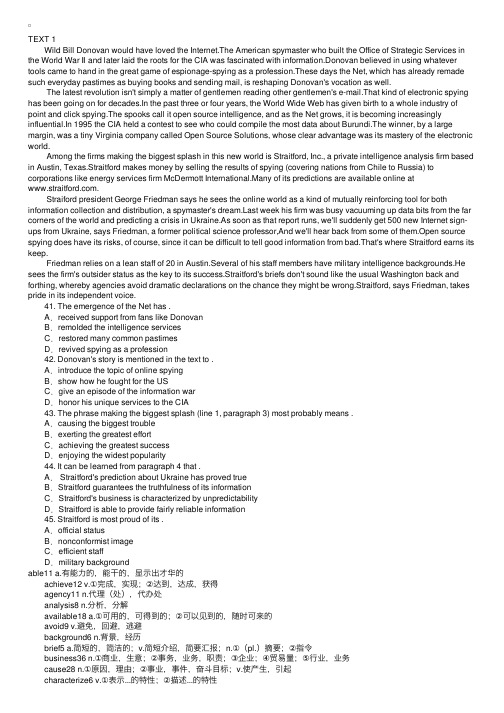
TEXT 1 Wild Bill Donovan would have loved the Internet.The American spymaster who built the Office of Strategic Services in the World War Ⅱ and later laid the roots for the CIA was fascinated with information.Donovan believed in using whatever tools came to hand in the great game of espionage-spying as a profession.These days the Net, which has already remade such everyday pastimes as buying books and sending mail, is reshaping Donovan's vocation as well. The latest revolution isn't simply a matter of gentlemen reading other gentlemen's e-mail.That kind of electronic spying has been going on for decades.In the past three or four years, the World Wide Web has given birth to a whole industry of point and click spying.The spooks call it open source intelligence, and as the Net grows, it is becoming increasingly influential.In 1995 the CIA held a contest to see who could compile the most data about Burundi.The winner, by a large margin, was a tiny Virginia company called Open Source Solutions, whose clear advantage was its mastery of the electronic world. Among the firms making the biggest splash in this new world is Straitford, Inc., a private intelligence analysis firm based in Austin, Texas.Straitford makes money by selling the results of spying (covering nations from Chile to Russia) to corporations like energy services firm McDermott International.Many of its predictions are available online at. Straiford president George Friedman says he sees the online world as a kind of mutually reinforcing tool for both information collection and distribution, a spymaster's st week his firm was busy vacuuming up data bits from the far corners of the world and predicting a crisis in Ukraine.As soon as that report runs, we'll suddenly get 500 new Internet sign-ups from Ukraine, says Friedman, a former political science professor,And we'll hear back from some of them.Open source spying does have its risks, of course, since it can be difficult to tell good information from bad.That's where Straitford earns its keep. Friedman relies on a lean staff of 20 in Austin.Several of his staff members have military intelligence backgrounds.He sees the firm's outsider status as the key to its success.Straitford's briefs don't sound like the usual Washington back and forthing, whereby agencies avoid dramatic declarations on the chance they might be wrong.Straitford, says Friedman, takes pride in its independent voice. 41. The emergence of the Net has . A.received support from fans like Donovan B.remolded the intelligence services C.restored many common pastimes D.revived spying as a profession 42. Donovan's story is mentioned in the text to . A.introduce the topic of online spying B.show how he fought for the US C.give an episode of the information war D.honor his unique services to the CIA 43. The phrase making the biggest splash (line 1, paragraph 3) most probably means . A.causing the biggest trouble B.exerting the greatest effort C.achieving the greatest success D.enjoying the widest popularity 44. It can be learned from paragraph 4 that . A. Straitford's prediction about Ukraine has proved true B.Straitford guarantees the truthfulness of its information C.Straitford's business is characterized by unpredictability D.Straitford is able to provide fairly reliable information 45. Straitford is most proud of its . A.official status B.nonconformist image C.efficient staff D.military backgroundable11 a.有能⼒的,能⼲的,显⽰出才华的 achieve12 v.①完成,实现;②达到,达成,获得 agency11 n.代理(处),代办处 analysis8 n.分析,分解 available18 a.①可⽤的,可得到的;②可以见到的,随时可来的 avoid9 v.避免,回避,逃避 background6 n.背景,经历 brief5 a.简短的,简洁的;v.简短介绍,简要汇报;n.①(pl.)摘要;②指令 business36 n.①商业,⽣意;②事务,业务,职责;③企业;④贸易量;⑤⾏业,业务 cause28 n.①原因,理由;②事业,事件,奋⽃⽬标;v.使产⽣,引起 characterize6 v.①表⽰...的特性;②描述...的特性 click1 v.①点击;②发出滴答声;n.滴答声 collection1 n.收藏(品),收集(物) compile1 v.编辑,汇编 contest2 n.竞争,竞赛,⽐赛;v.竞争,⽐赛,争论 corporation10 n.公司,企业,团体 crisis3 n.([pl.]crises)危机,紧要关头 data22 n.(datum的复数)资料,数据 decade18 n.⼗年 declaration2 n.宣⾔,宣布,声明 dramatic4 a.①戏剧的,戏剧性的;②剧烈的,激进的;③显著的,引⼈注⽬的 efficient3 a.①有效的,效率⾼的;②有能⼒的,能胜任的 electronic8 a.电⼦的 episode1 n.⽚断,(连续剧的)⼀集 exert3 v.发挥,施加影响,运⽤ fascinate2 v.迷住,强烈吸引 firm14 a.①坚固的,稳固的;②坚决的,坚定的;n.公司,商号 former10 a.①前任的;②以前的,在前的;pron.前者 forth2 ad.向前,向外;(back and ~)来回地 guarantee5 n.保证,保证书;v.保证,担保 image1 n.①形象;②肖像,影像,印象 increasingly11 ad.不断增加地,⽇益 independent6 a.(of)独⽴的,⾃主的 influential1 a.①有影响的;②有权势的 information44 n.①通知,报告;②情报,信息 intelligence13 n.①智⼒,聪明;②理解⼒;③情报,消息,报导 lean2 v.①倾斜,屈⾝;②倚,靠,依赖;a.①瘦的,⽆脂肪的;②精⼲的,效率⾼的;③贫瘠的 margin1 n.①页边空⽩;②边缘;③余地;④幅度 military3 a.军事的,军⽤的,军队的 pastime1 n.消遣,娱乐 phrase6 n.短语,词语,习语 predict13 v.预⾔,预测,预告 private11 a.私⼈的,个⼈的,秘密的,私下的 profession5 n.职业,⾃由职业 reinforce2 v.增援,加强 reliable5 a.可靠的 rely6 v.①(on)依赖,依靠;②信赖,信任 restore3 v.①恢复,使回复;②归还,交还;③修复,重建 result37 n.结果,成果,成绩;v.①(in)导致,结果是;②(from)起因于,因...⽽造成 revive1 v.①使苏醒;②复苏,复兴 risk14 v.冒...的危险;n.风险,危险 science58 n.①科学;②学科 solution4 n.①解答,解决办法;②溶解,溶液 sound7 n.声⾳,声响;v.①发声,响;②听起来;a.①健全的,完好的;②正当的,有根据的;③彻底的,充分的 source11 n.①源,源泉;②来源,出处 splash1 v.溅,泼;n.①溅,飞溅声;②(make a ~)引起轰动 spy6 n.间谍;v.①当间谍,刺探;②察觉,发现 staff5 n.①全体职⼯,全体⼈员;②杠,棒;③参谋部;v.配备⼯作⼈员 status5 n.①地位,⾝份;②情形,状况 story11 n.①描述;②故事;③报道;④谎话;⑤楼层 topic3 n.话题,主题,题⽬ unique6 a.惟⼀的,独⼀⽆⼆的 vacuum1 n.真空,真空吸尘器;v.⽤真空吸尘器打扫 vocation1 n.职业,⾏业 web12 n.,蜘蛛 advantage13 n.优势, 有利条件 distribution6 n.分配,分发,配给物 emergence5 n.浮现,出现 espionage1 n.间谍,侦探 latest8 a.最近的 mastery1 n.掌握 mutually1 ad.互相地,互助 nonconformist1 a./n.不墨守陈规的(⼈) online8 n.联机,在线 popularity5 n.普及,流⾏ prediction6 n.预⾔,预报 remold1 vt.改造 reshape1 vt.改造,再成形 spook1 n.间谍,特务 spymaster2 n.间谍⾸脑 strategic2 a.战略的,战略上的 truthfulness1 n.真实,正当,坦率 unpredictability2 n.不可预测性 whereby2 ad.凭什么,由此难句1 The American spymaster who built the Office of Strategic Services in the World War Ⅱ and later laid the roots for the CIA was fascinated with information. [结构分析] 1. 本句主⼲结构是:The American spymaster ... was fascinated with information; 2. who引导的定语从句修饰the American spymaster,who在定语从句中作主语,谓语是and连接的built和laid; [本句难点]主要是从句关系复杂; [⽅法对策]找出主句和从句关系,然后找出各⾃的主⼲结构,就⽐较好理解本句; [例句精译]这位曾经在第⼆次世界⼤战时建⽴了战略服务处,后来⼜为中央情报局的成⽴打下了基础的美国间谍⼤师对情报是如此着迷。
2009年考研英语阅读理解题精读篇第三篇
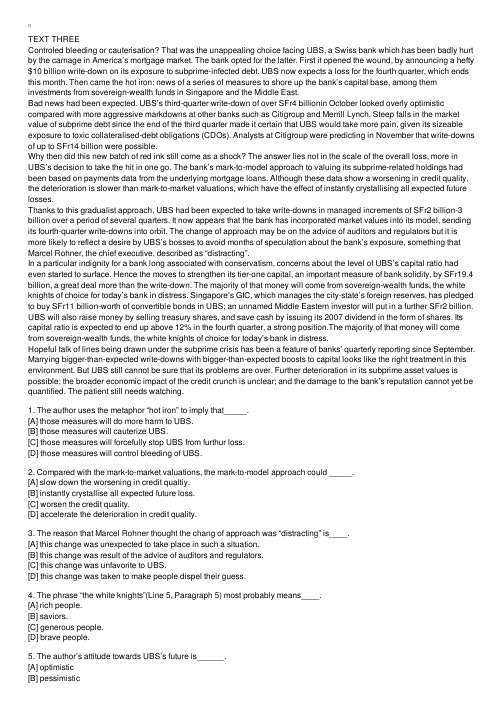
TEXT THREEControled bleeding or cauterisation? That was the unappealing choice facing UBS, a Swiss bank which has been badly hurt by the carnage in America’s mortgage market. The bank opted for the latter. First it opened the wound, by announcing a hefty $10 billion write-down on its exposure to subprime-infected debt. UBS now expects a loss for the fourth quarter, which ends this month. Then came the hot iron: news of a series of measures to shore up the bank’s capital base, among them investments from sovereign-wealth funds in Singapore and the Middle East.Bad news had been expected. UBS’s third-quarter write-down of over SFr4 billionin October looked overly optimistic compared with more aggressive markdowns at other banks such as Citigroup and Merrill Lynch. Steep falls in the market value of subprime debt since the end of the third quarter made it certain that UBS would take more pain, given its sizeable exposure to toxic collateralised-debt obligations (CDOs). Analysts at Citigroup were predicting in November that write-downs of up to SFr14 billion were possible.Why then did this new batch of red ink still come as a shock? The answer lies not in the scale of the overall loss, more in UBS’s decision to take the hit in one go. The bank’s mark-to-model approach to valuing its subprime-related holdings had been based on payments data from the underlying mortgage loans. Although these data show a worsening in credit quality, the deterioration is slower than mark-to-market valuations, which have the effect of instantly crystallising all expected future losses.Thanks to this gradualist approach, UBS had been expected to take write-downs in managed increments of SFr2 billion-3 billion over a period of several quarters. It now appears that the bank has incorporated market values into its model, sending its fourth-quarter write-downs into orbit. The change of approach may be on the advice of auditors and regulators but it is more likely to reflect a desire by UBS’s bosses to avoid months of speculation about the bank’s exposure, something that Marcel Rohner, the chief executive, described as “distracting”.In a particular indignity for a bank long associated with conservatism, concerns about the level of UBS’s capital ratio had even started to surface. Hence the moves to strengthen its tier-one capital, an important measure of bank solidity, by SFr19.4 billion, a great deal more than the write-down. The majority of that money will come from sovereign-wealth funds, the white knights of choice for today’s bank in distress. Singapore’s GIC, which manages the city-state’s foreign reserves, has pledged to buy SFr11 billion-worth of convertible bonds in UBS; an unnamed Middle Eastern investor will put in a further SFr2 billion. UBS will also raise money by selling treasury shares, and save cash by issuing its 2007 dividend in the form of shares. Its capital ratio is expected to end up above 12% in the fourth quarter, a strong position.The majority of that money will come from sovereign-wealth funds, the white knights of choice for today’s bank in distress.Hopeful talk of lines being drawn under the subprime crisis has been a feature of banks’ quarterly reporting since September. Marrying bigger-than-expected write-downs with bigger-than-expected boosts to capital looks like the right treatment in this environment. But UBS still cannot be sure that its problems are over. Further deterioration in its subprime asset values is possible; the broader economic impact of the credit crunch is unclear; and the damage to the bank’s reputation cannot yet be quantified. The patient still needs watching.1. The author uses the metaphor “hot iron” to imply that_____.[A] those measures will do more harm to UBS.[B] those measures will cauterize UBS.[C] those measures will forcefully stop UBS from furthur loss.[D] those measures will control bleeding of UBS.2. Compared with the mark-to-market valuations, the mark-to-model approach could _____.[A] slow down the worsening in credit qualtiy.[B] instantly crystallise all expected future loss.[C] worsen the credit quality.[D] accelerate the deterioration in credit quality.3. The reason that Marcel Rohner thought the chang of approach was “distracting” is____.[A] this change was unexpected to take place in such a situation.[B] this change was result of the advice of auditors and regulators.[C] this change was unfavorite to UBS.[D] this change was taken to make people dispel their guess.4. The phrase “the white knights”(Line 5, Paragraph 5) most probably means____.[A] rich people.[B] saviors.[C] generous people.[D] brave people.5. The author’s attitude towards UBS’s future is______.[A] optimistic[B] pessimistic[C] uncertain[D] none of the above篇章分析:本篇⽂章介绍了UBS银⾏⽬前⾯临的困境以及其解决困境的⼀系列措施。
2011年考研英语(一)阅读 text 4 精读精讲
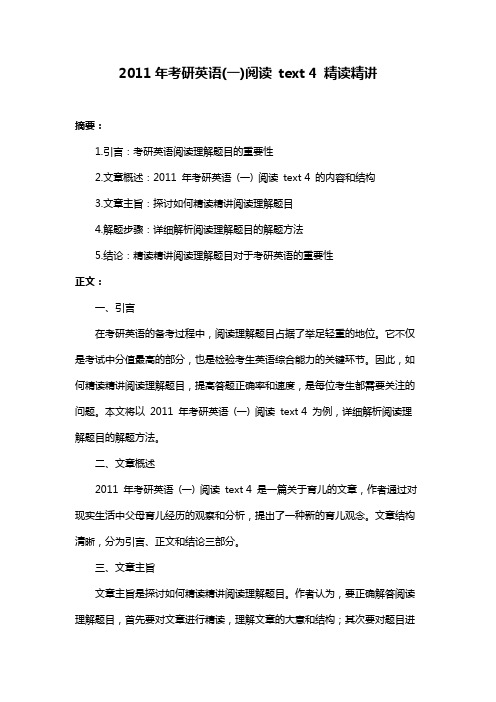
2011年考研英语(一)阅读text 4 精读精讲摘要:1.引言:考研英语阅读理解题目的重要性2.文章概述:2011 年考研英语(一) 阅读text 4 的内容和结构3.文章主旨:探讨如何精读精讲阅读理解题目4.解题步骤:详细解析阅读理解题目的解题方法5.结论:精读精讲阅读理解题目对于考研英语的重要性正文:一、引言在考研英语的备考过程中,阅读理解题目占据了举足轻重的地位。
它不仅是考试中分值最高的部分,也是检验考生英语综合能力的关键环节。
因此,如何精读精讲阅读理解题目,提高答题正确率和速度,是每位考生都需要关注的问题。
本文将以2011 年考研英语(一) 阅读text 4 为例,详细解析阅读理解题目的解题方法。
二、文章概述2011 年考研英语(一) 阅读text 4 是一篇关于育儿的文章,作者通过对现实生活中父母育儿经历的观察和分析,提出了一种新的育儿观念。
文章结构清晰,分为引言、正文和结论三部分。
三、文章主旨文章主旨是探讨如何精读精讲阅读理解题目。
作者认为,要正确解答阅读理解题目,首先要对文章进行精读,理解文章的大意和结构;其次要对题目进行精讲,分析题目类型,找出关键词和答案线索。
四、解题步骤1.精读文章:在解答阅读理解题目之前,首先要对文章进行精读。
精读时要注意抓住文章的主题、中心思想和结构,了解文章的背景和写作目的。
这有助于对文章的细节有更深入的理解,提高答题的正确率。
2.精讲题目:在仔细阅读题目后,要对题目进行精讲。
精讲时要分析题目的类型,如事实细节题、推理判断题、主旨大意题等。
同时要注意找出关键词和答案线索,这些线索通常包括文章的主题词、同义词和具体细节信息。
3.筛选选项:在找出答案线索后,要对选项进行筛选。
筛选时要注意选项的内容是否与文章的意思相符,是否存在偷换概念、夸大或缩小范围等错误。
正确答案通常是与文章意思最接近的选项。
五、结论精读精讲阅读理解题目是提高考研英语阅读理解能力的关键。
- 1、下载文档前请自行甄别文档内容的完整性,平台不提供额外的编辑、内容补充、找答案等附加服务。
- 2、"仅部分预览"的文档,不可在线预览部分如存在完整性等问题,可反馈申请退款(可完整预览的文档不适用该条件!)。
- 3、如文档侵犯您的权益,请联系客服反馈,我们会尽快为您处理(人工客服工作时间:9:00-18:30)。
考研英语阅读理解精读篇解析第一篇European Union environmental officials have determined that two kinds of genetically modified corn could harm butterflies, affect food chains and disturb life in rivers and streams, and they have proposed a ban on the sale of the seeds, which are made by DuPont Pioneer, Dow Agrosciences and Syngenta. The preliminary decisions are circulating within the European Commission, which has the final say. Some officials there are skeptical of a ban that would upset the powerful biotechnology industry and could exacerbate tensions with important trading partners like the United States. The seeds are not available on the European market for cultivation.In the decisions, the environment commissioner, Stavros Dimas, contends that the genetically modified corn, or maize could affect certain butterfly species, specifically the monarch,and other beneficial insects. For instance, research this year indicates that larvae of the monarch butterfly exposed to the genetically modified corn ''behave differently than other larvae.'' In the decision concerning the corn seeds produced by Dow and Pioneer, Mr. Dimas calls ''potential damage on the environment irreversible.'' In the decision on Syngenta's corn, he says that ''the level of risk generated by the cultivation of this product for the environment is unacceptable.''A decision by the European Union to bar cultivation of the genetically modified crops would be the first of its kind in the trade bloc, and would intensify the continuing battle over genetically modified corn. Banning the applications for corn crops also would mark a bold new step for European environmental authorities, who are already aggressively pursuing regulations on emissions from cars and aircraft, setting it at odds with the United States and angering industries.''These products have been grown in the U.S. and other countries for years,'' said Stephen Norton, a spokesman for the United States trade representative. ''We are not aware of any other case when a product has been rejected after having been reviewed and determined safe'' by European food safety authorities, he said.Barbara Helfferich, a spokeswoman for Mr. Dimas, declined to comment on the specifics of the procedure because commissioners had not yet made a final decision. But she said that the European Union was within its rights to make decisions based on the ''precautionary principle'' even when scientists had found no definitive evidence proving products can cause harm. She said that the decisions by Mr. Dimas could go before the commission within a few weeks, but she said that no date had been set. In the decisions, Mr. Dimas cited recent research showing that consumption ofgenetically modified ''corn byproducts reduced growth and increased mortality of nontarget stream insects'' and that these insects ''are important prey for aquatic and riparian predators'' and that this could have ''unexpected ecosystem-scale consequences.''Although still preliminary, his decisions could drastically tilt the policy against future approvals of genetically modified crops, said Nathalie Moll, a spokeswoman for Europabio, an industry group with 80 members including Syngenta, Pioneer and Dow. Europabio says that the crops grown using the genetically modified corn are already imported into several European countries, including France and Germany, where they are used to feed animals like cows and chickens.Rob Gianfranceschi, spokesman at the United States mission to the European Union in Brussels, said it was too early to comment on a decision that had not yet been formalized. But he made clear that the United States remained frustrated with European policies on genetically modified crops.1. The preliminary decisions are made by_____.[A] DuPont Pioneer, Dow Agrosciences and Syngenta[B] European Union environmental officials[C] European Commision[D] Starvros Dimas2. To the decisions, the European Commission officials’ attitudes are _____.[A] skeptical[B] controversial[C] contradictory[D] divergent3. About the decisions, which one of the following statements is TRUE?[A] The decisions aims to put a ban the sale of the seeds of genetically modified corn due to political and biological concerns.[B] The decisions are warmly embraced by all EU members but bitterly rejected by their trade partners.[C] The decisions could probably be made even if no definitive evidence proving the products harmful is found.[D] there is high possibility that the decisions would be approved by the European Commission.4. Mr. Dimas cited many researches on the genetically modified corn in his decision in order to_____.[A] dispel some officials’ doubt on his decisions[B] enhance the strength of his decision-making[C] demonstrate the latest achievement of his decision[D] assure that they can be presented before the commission with solid evidence5. The word “tilt” (Line 1, Paragraph 6) most probably means_____.[A] incline[B] affect[C] induce[D] evoke文章剖析:这篇文章介绍了联合国环境官员就转基因食品提出的决议的一些情况。
